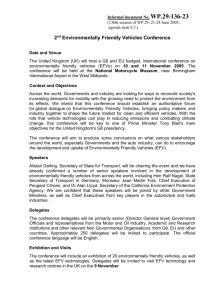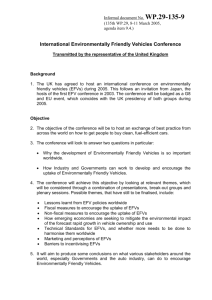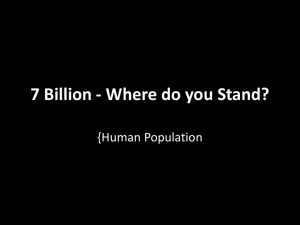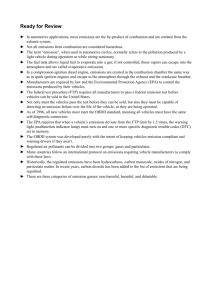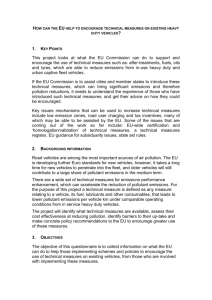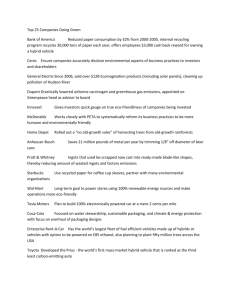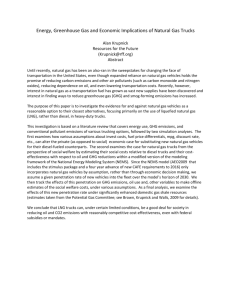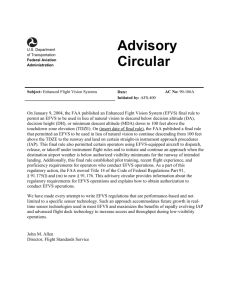Fact sheet
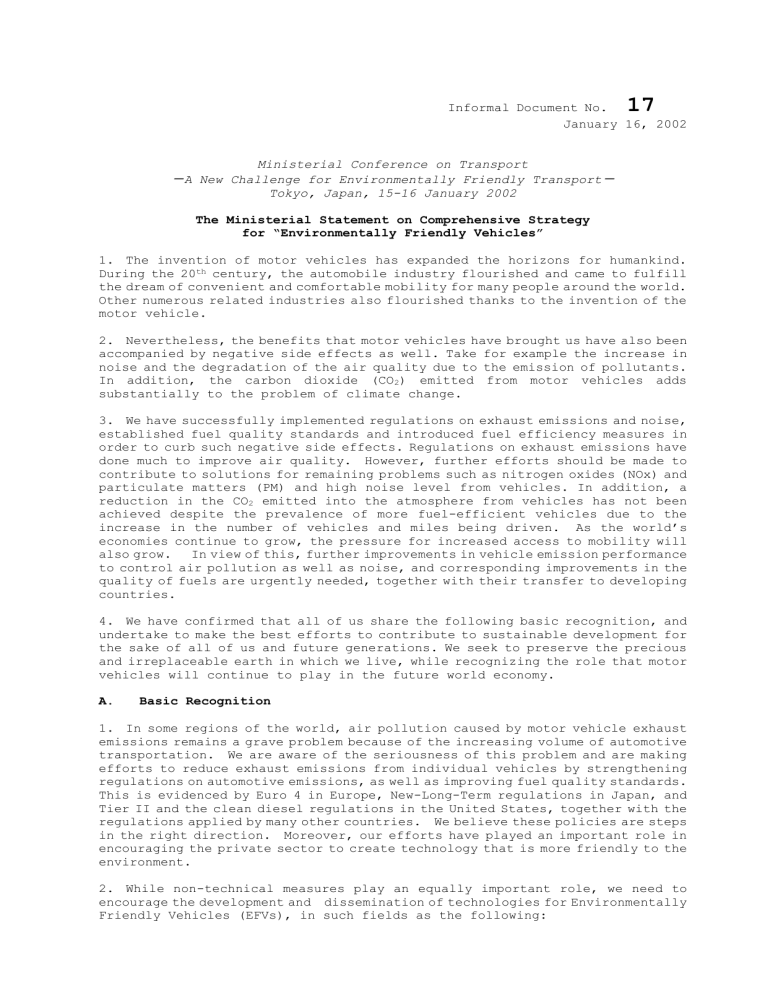
Informal Document No.
17
January 16, 2002
Ministerial Conference on Transport
- A New Challenge for Environmentally Friendly Transport -
Tokyo, Japan, 15-16 January 2002
The Ministerial Statement on Comprehensive Strategy for “Environmentally Friendly Vehicles”
1. The invention of motor vehicles has expanded the horizons for humankind.
During the 20 th century, the automobile industry flourished and came to fulfill the dream of convenient and comfortable mobility for many people around the world.
Other numerous related industries also flourished thanks to the invention of the motor vehicle.
2. Nevertheless, the benefits that motor vehicles have brought us have also been accompanied by negative side effects as well. Take for example the increase in noise and the degradation of the air quality due to the emission of pollutants.
In addition, the carbon dioxide (CO
2
) emitted from motor vehicles adds substantially to the problem of climate change.
3. We have successfully implemented regulations on exhaust emissions and noise, established fuel quality standards and introduced fuel efficiency measures in order to curb such negative side effects. Regulations on exhaust emissions have done much to improve air quality. However, further efforts should be made to contribute to solutions for remaining problems such as nitrogen oxides (NOx) and particulate matters (PM) and high noise level from vehicles. In addition, a reduction in the CO
2
emitted into the atmosphere from vehicles has not been achieved despite the prevalence of more fuel-efficient vehicles due to the increase in the number of vehicles and miles being driven. As the world’s economies continue to grow, the pressure for increased access to mobility will also grow. In view of this, further improvements in vehicle emission performance to control air pollution as well as noise, and corresponding improvements in the quality of fuels are urgently needed, together with their transfer to developing countries.
4. We have confirmed that all of us share the following basic recognition, and undertake to make the best efforts to contribute to sustainable development for the sake of all of us and future generations. We seek to preserve the precious and irreplaceable earth in which we live, while recognizing the role that motor vehicles will continue to play in the future world economy.
A. Basic Recognition
1. In some regions of the world, air pollution caused by motor vehicle exhaust emissions remains a grave problem because of the increasing volume of automotive transportation. We are aware of the seriousness of this problem and are making efforts to reduce exhaust emissions from individual vehicles by strengthening regulations on automotive emissions, as well as improving fuel quality standards.
This is evidenced by Euro 4 in Europe, New-Long-Term regulations in Japan, and
Tier II and the clean diesel regulations in the United States, together with the regulations applied by many other countries. We believe these policies are steps in the right direction. Moreover, our efforts have played an important role in encouraging the private sector to create technology that is more friendly to the environment.
2. While non-technical measures play an equally important role, we need to encourage the development and dissemination of technologies for Environmentally
Friendly Vehicles (EFVs), in such fields as the following:
a) In the field of passenger vehicles, successive strengthening of exhaust emissions regulations, the introduction of fuel efficiency standards, and the application in Europe of a voluntary agreement with automakers to encourage lower CO
2
emissions, have produced and are producing good results. Especially with regard to gasoline-fuelled vehicles, hybrid and other types of economically viable vehicles have already been launched into the market.
Diesel engine technology has made substantial progress and further progress can be foreseen, particularly in NOx and PM emissions control.
However, considering the future increase in the number of vehicles on a global scale, additional technical improvements are required to substantially decrease greenhouse gas emissions and pollutant emissions; b) In the field of heavy-duty vehicles, represented by buses and large commercial trucks, the diesel engine remains the primary source of power for the foreseeable future. The exhaust emissions of the diesel engines have been strictly regulated in many countries and even more rigorous restrictions will be introduced in the near future.
The prospects of the developing feasible technologies to meet rigorous standards, which require near-zero emission levels, are being ardently debated in some arenas. The introduction of such technologies is urgently needed especially for countries where the air pollution caused by the exhaust emissions is a pressing matter; c) Another high priority problem to be addressed is traffic noise in urban areas. High noise emissions contribute to a degradation of the quality of life. Therefore EFVs should also achieve low noise emissions levels.
B. Future Direction of Policies
We have reached the consensus that our future actions should be in line with the following direction of policies: a) Some of Fuel Cell Vehicles, CNG and LNG Vehicles, Electric Vehicles as well as ultra-clean gasoline and diesel vehicles are examples of EFVs.
Nevertheless, it may be useful to discuss the EFV concept which should address factors including emission performances of air pollutants, greenhouse gas and noise, since such concept may help the manufacturers to develop EFV technologies; b) We should provide our support to and encourage the further development and dissemination of EFVs. In particular, the role of governments is more important in the field of buses and large commercial trucks, because in some countries, vehicle manufacturers may have difficulty making voluntary efforts to improve emissions levels due to smaller market size and larger development cost. Attention may also be required to necessary infrastructure for wider use of EFVs; c) The availability of appropriate fuels is a crucial issue in promoting the development and dissemination of EFVs and should therefore be treated in an integrated manner. A worldwide ban on the use of lead in gasoline and the introduction of low sulfur gasoline and diesel should be carried out without undue delay. The introduction of alternative non-fossil fuels should be accelerated; d) To discuss EFV concept and to facilitate the development and
dissemination of EFVs, close international cooperation will be an effective approach. As a first step forward, we share the collective view that it is important to hold an “International Meeting of EFVs.”
In the International Meeting, we will discuss the possible solution based on the knowledge of existing and future vehicle technologies and the availability of different type of fuels, and explore the possibility of international coordination of policy to facilitate the development and dissemination of EFVs. When doing so, we should carefully avoid any overlap and duplication of issues with the other exiting forum; e) In order to encourage the widespread use of EFVs, it is essential to harmonize EFV standards throughout the world. In view of this, we support the initiative for harmonization of EFV standards and test procedures under the Global Agreement within the framework of the United Nations/Economic
Commission for Europe/World Forum for Harmonization of Vehicles
Regulations.
* * *
January 16, 2002
Fact sheet on Ministerial Conference on Transport
Theme: A New Challenge for Environmentally Friendly Transport
Date: January 15 and 16
Place: Tokyo
Organizer: Japanese Ministry of Land, Infrastructure and Transport
Participating countries and organization: Australia, Austria, Belgium, Canada,
Denmark, France, Germany, Greece, Japan, Italy, Luxembourg, Netherlands, Norway,
Portugal, Republic of Korea, Singapore, Spain, Sweden, U.K., U.S.A, EU, IMO
Number of participants: approx. 180 (approx. 130 from overseas)
__________

